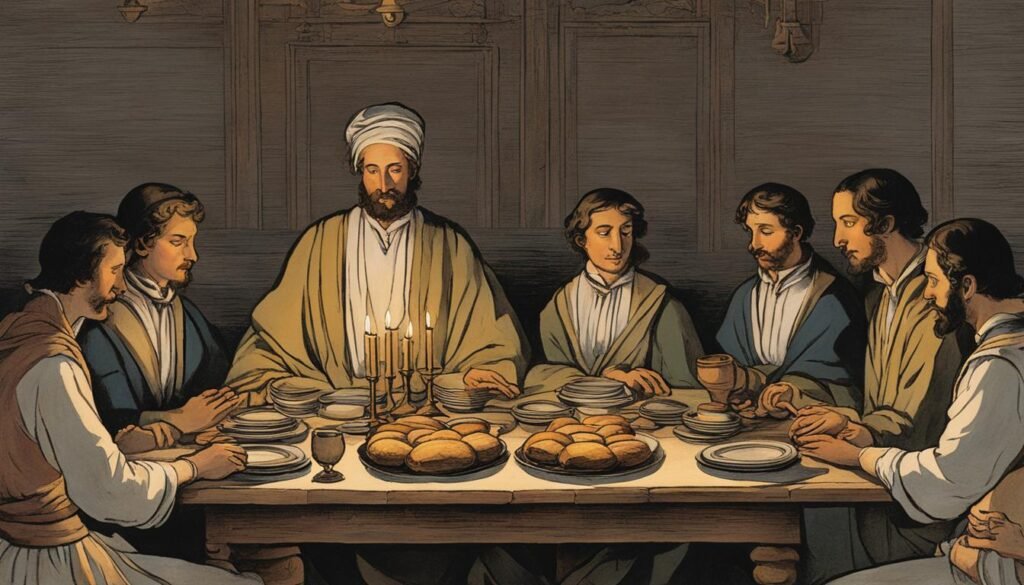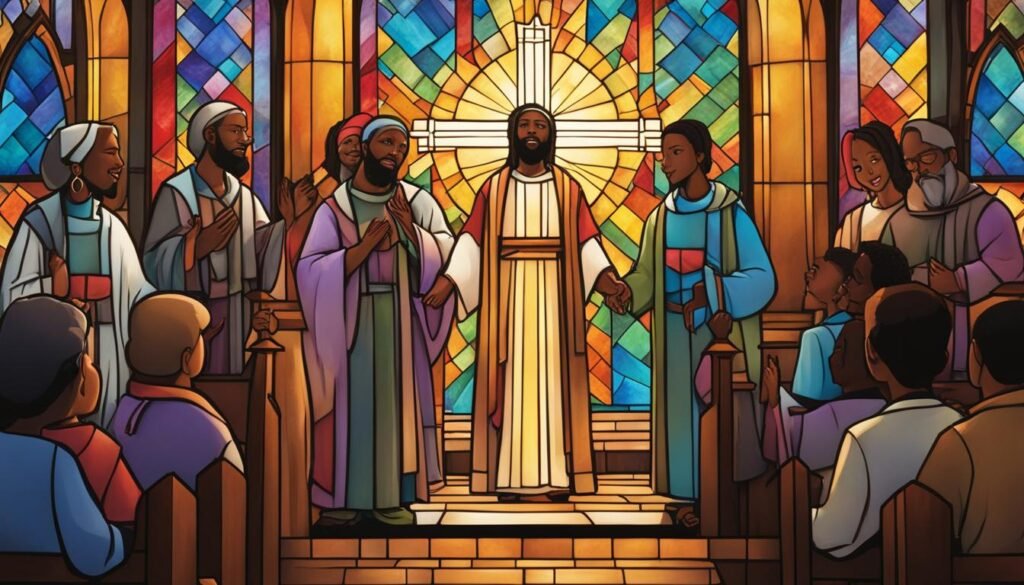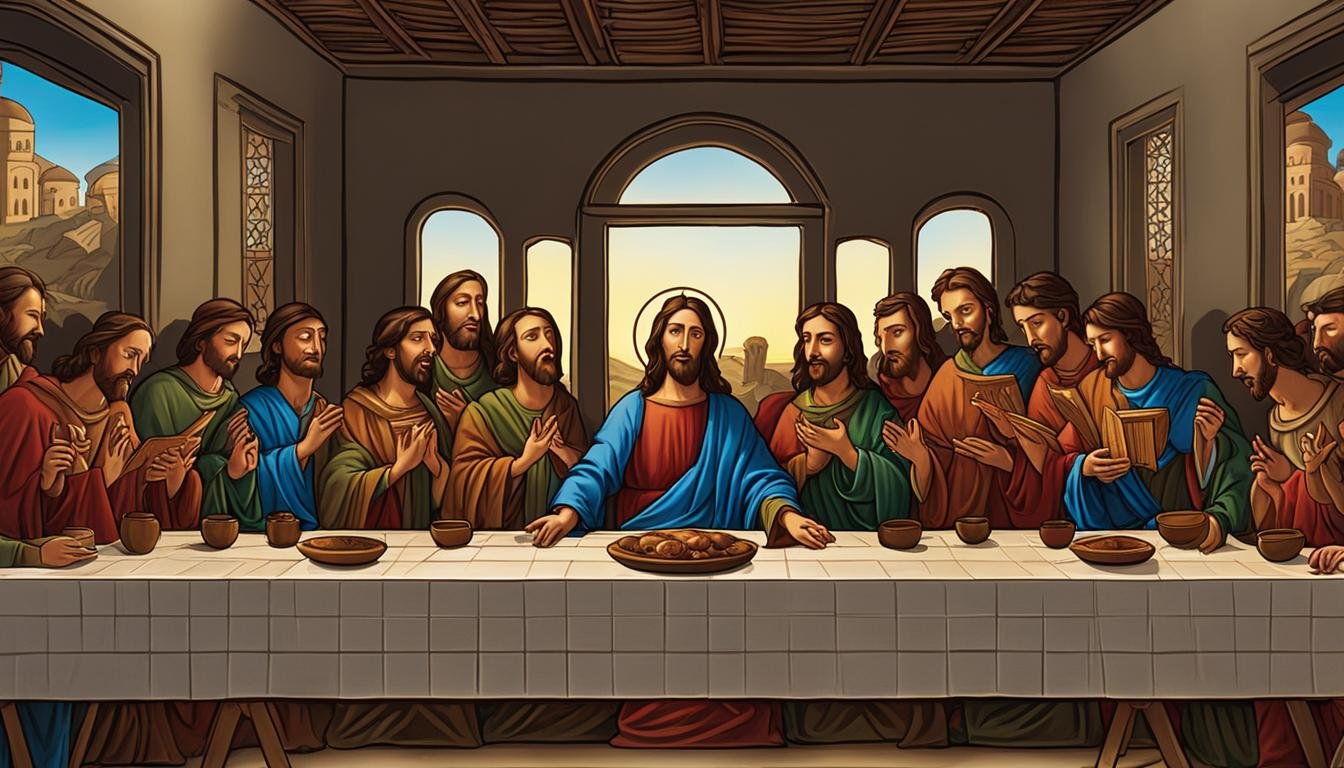Jesus, a central figure in Christian heritage, is recorded as singing a hymn during the Last Supper. This significant moment in Scripture holds deep meaning for believers and raises intriguing questions about the hymn itself. While the specific hymn is not explicitly mentioned, understanding the context and significance of Jesus singing can provide valuable insights into his role as a worship leader and mediator.
Key Takeaways:
- Jesus sang a hymn with his disciples at the conclusion of the Last Supper.
- The specific hymn is not mentioned, but it is likely a portion of Psalms 114-118.
- This act demonstrates Jesus’s participation in community worship and his commitment to engage in the disciples’ humanity.
- Singing hymns allows Jesus to fulfill his role as our Brother, mediating our relationship with God and leading our worship.
- The hymn Jesus sang holds deep significance in the events of Holy Week, highlighting the eventual salvation brought by his death and resurrection.
The Significance of Jesus Singing
In the book of Hebrews 2:12, it is mentioned that Jesus sang a song of praise. This simple act of singing holds profound meaning and significance. It reveals Jesus’s active participation in community worship and his willingness to engage fully in the human experience.
By singing hymns to the Father, Jesus fulfills his role as our Brother, mediating our relationship with God and leading our worship. Through his singing, Jesus demonstrates his deep connection to humanity and exemplifies the importance of communal worship in the Christian faith.
“I will tell of your name to my brothers and sisters; in the midst of the congregation I will praise you.” – Hebrews 2:12
Jesus’s singing not only reflects his intimate relationship with the Father but also speaks to his ministry as the mediator between God and humanity. As we join in worship and lift our voices in song, we participate in this twofold mediating work of Christ, uniting with him as members of his body, the Church.
Through singing, we express our love, adoration, and gratitude to God, following the example set by Jesus himself. It is a means of connecting with the divine, aligning our hearts and minds with the worship of heaven.
The Power of Music in Worship
Music has always played a significant role in worship across different cultures and religions. In the context of Christianity, music has the power to touch souls, uplift spirits, and evoke a sense of reverence and awe. It has the ability to convey emotions and truths that words alone often cannot express.
For Jesus, singing was not merely an external observance but a heartfelt expression of worship. As he sang, he connected with the Father and led others to do the same. This underscores the importance of music in our own worship today.
Whether through hymns, contemporary worship songs, or ancient chants, music allows us to engage with God on a deeper level. It can stir our souls, help us find solace in times of despair, and inspire us to live out our faith more fully.
Jesus’s Example of Worship
Jesus’s singing during his earthly ministry serves as an example for believers. His willingness to participate in worship and lead others by example reflects the integral role worship plays in the Christian life.
Through his singing, Jesus demonstrated the beauty and power of worship, reminding us that it is not simply a duty to be performed but a heartfelt response to who God is and what he has done.
As we follow Jesus’s example and engage in worship through song, we can experience a deeper connection with God and find renewed strength and joy in our faith journey.
The Hallel and the Last Supper
During the Last Supper, it is likely that Jesus and his disciples sang the Hallel, a collection of Psalms 113-118, in accordance with the Passover tradition. The Hallel is a joyous celebration of praise and thanksgiving to God, and its recitation is an integral part of the Passover feast.
The singing of these Psalms holds great significance in the events of Holy Week, as they contain references to the eventual salvation brought by the death and resurrection of Christ. Psalm 118, in particular, takes on a prophetic tone, foreshadowing Jesus as the rejected cornerstone and the ultimate sacrifice for all of mankind.
“The stone that the builders rejected has become the cornerstone.” – Psalm 118:22
The inclusion of the Hallel during the Last Supper would have added a layer of spiritual depth to the meal, further connecting the Passover traditions to Jesus’s impending sacrifice. As the disciples sang these Psalms, they would have been reminded of the promises of God and the salvation that Jesus was about to fulfill.

Jesus and Music
Although the Bible does not specifically mention Jesus singing outside of the Last Supper, it is reasonable to assume that as a fully human being, Jesus would have engaged in music and song. Music has the power to lift spirits and convey emotions, and Jesus, as a human, would have experienced these benefits as well.
The Tradition of Singing the Hallel
Singing the Hallel was a long-standing tradition among the Jewish people during Passover. This tradition included singing Psalms 113-118, or selected stanzas from them, at the meal. Jesus and his disciples, being observant Jews, would likely have followed this tradition and sung the Hallel during the Last Supper. These Psalms would have held deep meaning, especially in light of the impending crucifixion and resurrection.
The Profound Words of Psalm 118
Psalm 118 contains profound verses that hold significant relevance to the events surrounding Jesus during the Last Supper. Verses such as “The stone the builders rejected has become the cornerstone” (Psalm 118:22) and “I will not die but live, and will proclaim what the Lord has done” (Psalm 118:17) foreshadow Jesus as the rejected cornerstone and the one who would proclaim the salvation of God. Singing these words would have carried deep significance for Jesus.
The words of Psalm 118 hold profound meaning, especially in relation to Jesus as the cornerstone. In this verse, Jesus is portrayed as the stone that the builders rejected but ultimately became the essential foundation, holding everything together. This imagery points to Jesus’s rejection by the religious leaders of his time and his subsequent role as the cornerstone of salvation for all mankind.
“The stone the builders rejected has become the cornerstone.”
These words highlight both Jesus’s ultimate rejection by those who did not recognize his true identity and his pivotal role in God’s plan for salvation. Through his rejection, Jesus became the cornerstone on which the entire faith is built, offering redemption and eternal life to all who believe in him.
Another verse from Psalm 118, “I will not die but live, and will proclaim what the Lord has done” (Psalm 118:17), further emphasizes Jesus’s mission and purpose. This verse reflects his determination to fulfill God’s plan and proclaim the salvation that he would bring through his sacrifice.
“I will not die but live, and will proclaim what the Lord has done.”
By singing these words during the Last Supper, Jesus expressed his deep understanding of the significance of his impending sacrifice and his role as the bringer of salvation. These verses foreshadowed the rejection Jesus would face and the ultimate victory he would achieve through his death and resurrection.
The words of Psalm 118 continue to resonate with believers today, reminding them of Jesus as the rejected cornerstone and the source of salvation. As Christians reflect on the profound words of this Psalm, they are reminded of the immense love and sacrifice of Jesus, inviting them to embrace his salvation and proclaim what the Lord has done.
Reflecting on Jesus’s Last Song
Taking the time to reflect on the words of Psalms 113-118, which Jesus and his disciples likely sang during the Last Supper, allows us to enter into the mindset of Jesus in his final hours. These Psalms express themes of God’s goodness, protection, and the salvation brought by Christ’s death and resurrection. By immersing ourselves in these words, we can gain a deeper understanding of Jesus’s thoughts and emotions at that pivotal moment.
Jesus’s Last Song: Psalms 113-118
| Psalm | Theme |
|---|---|
| Psalm 113 | Praise to the Lord |
| Psalm 114 | God’s Deliverance |
| Psalm 115 | Idols and True God |
| Psalm 116 | Thanksgiving for Deliverance |
| Psalm 117 | Praise to the Lord |
| Psalm 118 | The Rejected Cornerstone |
As we reflect on these Psalms, we can see how Jesus’s last song encapsulated not only his worship and praise to God but also the imminent events of his crucifixion and resurrection. Psalm 118, in particular, foreshadows Jesus as the rejected cornerstone and the one who would bring salvation to all mankind. By contemplating these powerful words, we can gain a deeper appreciation for the profound significance of Jesus’s last song.

The Power of Music in Worship
Music has a profound impact on worship and can resonate with individuals in a unique way. Just as Jesus sang hymns to the Father, Christians today can find solace, inspiration, and a connection to God through music. The songs sung during Holy Week, including the hymn Jesus sang at the Last Supper, hold great significance and can help believers reflect on the sacrifice and salvation of Jesus.
Music has always held a special place in Christian worship, allowing believers to express their devotion, gratitude, and adoration to God. Whether through hymns, contemporary worship songs, or traditional chants, music has the power to engage our hearts and minds, creating a powerful and transformative worship experience.
The act of singing praises to God is deeply rooted in Christian tradition and has been practiced throughout history. The Psalms, for example, were often sung as a means of offering worship to God. This rich heritage of musical worship continues to be cherished and celebrated in churches worldwide.
The Emotional Connection
When we engage in music during worship, it stirs our emotions and allows us to connect with God on a deeper level. The lyrics and melodies of worship songs have the ability to articulate our prayers, aspirations, and longings in ways that words alone sometimes cannot. Music has the power to move us, uplift our spirits, and create an atmosphere of reverence and awe.
“Music is a universal language that speaks to the soul and bypasses the intellect. It has the power to touch hearts, heal wounds, and bring people closer to God.” – John Peterson, Worship Leader
Uniting the Congregation
Music plays a vital role in fostering a sense of unity and community within the church. As believers come together to sing praises, they are reminded of their shared faith and the common bond they have in Christ. The act of singing collectively creates a harmonious and participatory worship experience, where everyone’s voices blend together in a beautiful symphony of praise.
During Holy Week, the songs sung in church take on even greater significance. They serve as a reflection of Jesus’s journey to the cross, inviting worshippers to enter into the narrative of his sacrifice and redemption. The hymn that Jesus sang at the Last Supper, along with other songs focused on the crucifixion and resurrection, provide a powerful backdrop for contemplation and worship during this sacred season.
A Personal Encounter with God
Music has the ability to transport us to a place of intimacy with God. It invites us to quiet our hearts, focus our thoughts, and surrender ourselves to God’s presence. Whether through contemplative hymns or energetic praise songs, music creates an environment where we can encounter God in a deeply personal way, allowing his truth and love to penetrate our souls.
As we participate in worship through music, we open ourselves up to the leading of the Holy Spirit. The melodies and lyrics guide us into a place of reverence and surrender, helping us to align our hearts with the heart of God. Through music, we can express our deepest emotions, pour out our praise, and receive God’s love and transformational power.

Music holds a special place in the life of a believer during Holy Week. It allows us to reflect on the sacrifice of Jesus, rejoice in his resurrection, and express our gratitude for the salvation he offers. Whether through ancient hymns, modern worship songs, or personal expressions of praise, music has the power to elevate our worship and draw us closer to God.
The Continuing Song of Jesus
Jesus’s singing did not end at the Last Supper. In fact, beyond that significant event, Romans 15:9 portrays Jesus as not only a singer but also a skilled musician, playing an instrument as he fulfills the role of the Church’s chief worship leader. Just as he led his disciples in song during the Last Supper, Jesus continues to lead worship among all nations, uniting believers in a global choir to the praise of the Father.
“He leads worship among all nations, singing the praises of God.”
Jesus’s role as a mediator in our worship extends beyond his time on Earth. He brings salvation not only to the Jewish people but also to Gentiles, embracing all who believe in him. Through his singing and leadership, Jesus sets an example for worship in the Church, facilitating a transformative and unifying experience.
The Power of Jesus’s Worship Leadership
In Jesus’s role as the Church’s chief worship leader, he brings a unique power that transcends time and place. His music and singing reach deep into the hearts of believers, stirring their spirits and drawing them into a deeper connection with God. Jesus’s worship leadership guides the Church in offering heartfelt praise, adoration, and thanksgiving to the Father.
As a skilled musician, Jesus uses the power of music to inspire and uplift the congregation. His melodies and harmonies carry messages of hope, peace, and healing, cultivating an atmosphere of reverence and awe. Through the continuing song of Jesus, worship becomes an encounter with the divine, transforming the hearts and lives of those who participate.
The Uniting Force of Worship
Jesus’s leadership in worship serves as a unifying force that transcends cultural, societal, and geographical boundaries. Just as he leads worship among all nations, he brings together believers from diverse backgrounds and experiences. With Jesus as the ultimate conductor, worshippers become a harmonious ensemble, with their voices blending as they offer their praises collectively.
This global choir, led by Jesus, echoes the unity and love that he embodied during his earthly ministry. Through worship, believers are reminded of their shared faith and devotion to Christ. They are united in their desire to honor and glorify the Father, creating a powerful bond that extends beyond the physical boundaries of the Church.
| Benefits of Jesus’s Continuing Song | Transformative Worship | Unity Among Believers |
|---|---|---|
| Deepens spiritual connection | Builds an atmosphere of reverence | Fosters a sense of shared faith |
| Uplifts and inspires worshippers | Encourages awe and adoration | Promotes love and acceptance |
| Brings healing and restoration | Facilitates heartfelt praise | Transcends cultural barriers |
Jesus’s continuing song serves as a reminder of his everlasting presence and his ongoing work in the lives of believers. It inspires worshippers to offer their voices and talents as instruments of praise, creating a symphony of worship that resonates with the heavens. Through his leadership and the power of music, Jesus continues to draw people closer to God and unify the Church in worship, forming a beautiful tapestry of adoration that spans across time and space.
Conclusion
In conclusion, the act of Jesus singing during the Last Supper holds deep significance in Christian worship and reflection. Although the specific hymn he sang is not explicitly mentioned in Scripture, Jesus’s singing demonstrates his commitment to participate in community worship and his role as our mediator. Through his songs of praise, Jesus expressed his deep understanding of the salvation that would come through his sacrifice.
Reflecting on Jesus’s last song allows us to enter into his mindset and emotions during those final hours. It deepens our appreciation for his love and the power of music in worship. The hymn Jesus sang at the Last Supper reminds us of the ultimate sacrifice he would make, paving the way for our salvation and reconciliation with God.
Today, the legacy of Jesus’s singing continues as we engage in worship as a community. Just as Jesus led his disciples in song, he continues to be our worship leader, uniting believers from all nations in praise. As we reflect on Jesus’s hymn, may it inspire us to use the power of music to connect with God, express our devotion, and proclaim the salvation brought by Christ.
FAQ
How many times is Jesus recorded as singing in Scripture?
Jesus is recorded as singing in four passages in Scripture. (Matthew 26:30, Mark 14:26, Hebrews 2:12)
What hymn did Jesus sing at the Last Supper?
The specific hymn that Jesus sang at the Last Supper is not mentioned in Scripture. However, it is likely that he and his disciples sang a portion of the Hallel, including Psalms 113-118, which are a joyous celebration of praise and thanksgiving to God.
Did singing hold any significance in Jesus’s life?
Yes, Jesus’s singing demonstrates his participation in community worship and his commitment to engage in the disciples’ humanity. By singing hymns to the Father, Jesus fulfills his role as our Brother, mediating our relationship with God and leading our worship (Hebrews 2:12).
What is the Hallel and its significance in the Last Supper?
The Hallel is a collection of Psalms 113-118 that was traditionally sung during Passover. It is likely that Jesus and his disciples sang the Hallel during the Last Supper, as observant Jews. These Psalms hold great significance in the events of Holy Week, as they contain references to the salvation brought by the death and resurrection of Christ.
Did Jesus engage in music and song outside of the Last Supper?
While the Bible does not specifically mention Jesus singing outside of the Last Supper, it is reasonable to assume that as a fully human being, Jesus would have engaged in music and song. Music has the power to lift spirits and convey emotions, and Jesus, as a human, would have experienced these benefits as well.
Was it a common tradition to sing the Hallel during the Last Supper?
Yes, singing the Hallel was a long-standing tradition among the Jewish people during Passover. This tradition included singing Psalms 113-118, or selected stanzas from them, at the meal. Jesus and his disciples, being observant Jews, would likely have followed this tradition and sung the Hallel during the Last Supper.
What profound verses are found in Psalm 118?
Psalm 118 contains verses that hold significant relevance to the events surrounding Jesus during the Last Supper. Verses such as “The stone the builders rejected has become the cornerstone” and “I will not die but live, and will proclaim what the Lord has done” foreshadow Jesus as the rejected cornerstone and the one who would proclaim the salvation of God.
How can we reflect on Jesus’s last song?
Taking the time to reflect on the words of Psalms 113-118, which Jesus and his disciples likely sang during the Last Supper, allows us to enter into the mindset of Jesus in his final hours. These Psalms express themes of God’s goodness, protection, and the salvation brought by Christ’s death and resurrection. By immersing ourselves in these words, we can gain a deeper understanding of Jesus’s thoughts and emotions at that pivotal moment.
What is the power of music in worship?
Music has a profound impact on worship and can resonate with individuals in a unique way. Just as Jesus sang hymns to the Father, Christians today can find solace, inspiration, and a connection to God through music. The songs sung during Holy Week, including the hymn Jesus sang at the Last Supper, hold great significance and can help believers reflect on the sacrifice and salvation of Jesus.
Does Jesus’s singing continue beyond the Last Supper?
Yes, Romans 15:9 portrays Jesus as not only singing but also playing an instrument and fulfilling the role of the Church’s chief worship leader. He leads worship among all nations and brings salvation to both Jews and Gentiles. Jesus’s role as a mediator in our worship continues to this day, uniting believers in a global choir to the praise of the Father.
Source Links
- http://aokmusicandarts.com/news/2020/4/9/the-psalm-sang-at-the-last-supper
- https://www.desiringgod.org/articles/jesus-sings
- https://holinesstoday.org/imported-news/what-did-jesus-sing

I’m Benjamin, a passionate spiritual seeker and creator of Verses and Prayers. Alongside my girlfriend Emma and our pet lizard Mulle, I cherish family life, enjoy exploring new places, and am deeply involved in my church community. My love for reading and singing biblical verses inspires every aspect of my journey.

